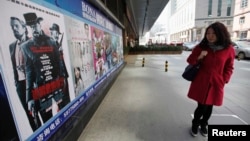Django Unchained, U.S. filmmaker Quentin Tarantino's violent slave revenge epic, was suddenly pulled from Chinese theaters on its opening day, prompting complaints about Beijing's tight censorship policies.
The film's distributors blame unspecified "technical difficulties" for the Thursday cancellation, which in some cases was reported to have forced moviegoers to leave cinemas midway through the showing of the film.
It is not known whether the theaters will later receive permission to show the western, which uses dark humor to tell the story of a freed American slave who exacts revenge on a cruel plantation owner in an attempt to liberate his wife.
Chinese government film censors remove material they view as too sexually explicit, violent or politically subversive. But Tarantino, who has a reputation for making violent movies, is reported to have cut or modified several violent scenes to satisfy Chinese censors.
Even though the film was widely promoted in China ahead of its release date, many disappointed moviegoers say on their microblogs they there are not surprised at the cancellation.
Some speculate that a short scene containing nudity may have have forced the cancellation. But others say some in Beijing may have become uncomfortable with the film's theme of an oppressed minority wreaking bloody retaliation on his masters.
There have been signs that Chinese censors are allowing some politically sensitive material into films. In December, many Chinese movie fans were surprised when state television aired "V for Vendetta," a famously anti-government film in which rebels incite a popular rebellion against a totalitarian government.
Despite the strict government censorship and other policies aimed at protecting China's domestic movie industry, uncensored Hollywood movies are still relatively easy to find in China, which has a thriving market in such pirated materials.
The film's distributors blame unspecified "technical difficulties" for the Thursday cancellation, which in some cases was reported to have forced moviegoers to leave cinemas midway through the showing of the film.
It is not known whether the theaters will later receive permission to show the western, which uses dark humor to tell the story of a freed American slave who exacts revenge on a cruel plantation owner in an attempt to liberate his wife.
Chinese government film censors remove material they view as too sexually explicit, violent or politically subversive. But Tarantino, who has a reputation for making violent movies, is reported to have cut or modified several violent scenes to satisfy Chinese censors.
Even though the film was widely promoted in China ahead of its release date, many disappointed moviegoers say on their microblogs they there are not surprised at the cancellation.
Some speculate that a short scene containing nudity may have have forced the cancellation. But others say some in Beijing may have become uncomfortable with the film's theme of an oppressed minority wreaking bloody retaliation on his masters.
There have been signs that Chinese censors are allowing some politically sensitive material into films. In December, many Chinese movie fans were surprised when state television aired "V for Vendetta," a famously anti-government film in which rebels incite a popular rebellion against a totalitarian government.
Despite the strict government censorship and other policies aimed at protecting China's domestic movie industry, uncensored Hollywood movies are still relatively easy to find in China, which has a thriving market in such pirated materials.




